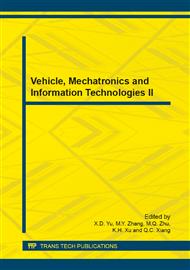p.1487
p.1492
p.1496
p.1500
p.1504
p.1510
p.1515
p.1520
p.1525
Research on Robust Control of Anti-Locked Braking System of Vehicles
Abstract:
It is necessary to study the stability and robustness of the anti-locked braking system (ABS) of vehicles because there are parameter perturbations and un-modeled dynamic features in the system. On the basis of the ABS model and the mixed sensitivity method, a robust control strategy for ABS is put forward and the H robust controller is designed in this paper. The simulation of the process of ABS shows that the robust control system can keep stable and is effective on decreasing the undesirable influence of the fluctuation of parameter such as load, brake performance coefficient and road condition. Furthermore, the tire slip ratio can be effectively controlled around the desired value, and the braking performance can be obviously improved.
Info:
Periodical:
Pages:
1504-1509
Citation:
Online since:
March 2014
Authors:
Price:
Сopyright:
© 2014 Trans Tech Publications Ltd. All Rights Reserved
Share:
Citation:


